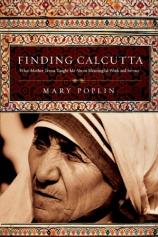Finding Calcutta: What Mother Teresa Taught Me About Meaningful Work and Service
Review
Finding Calcutta: What Mother Teresa Taught Me About Meaningful Work and Service
The first thing you need to know about this book, especially if you're considering it as a gift for someone else, is that it contains a significant and unfortunate printing error: pages 97-128 appear twice.
There you are at the bottom of page 128, reading about one of Mother Teresa's favorite stories, and your eyes go to the top of the next page and land on a string of words that make no sense in the context of what you've been reading. It took me a while to figure out the error, and now you don't have to. I simply clipped the duplicate batch of pages together and kept reading; you may want to check the bookstore copy before you buy it. Hopefully, the publisher noticed the error and sent the book back for a corrected print run.
Okay, with that out of the way, we can get to the merits of the book, and they are plentiful. Mary Poplin spent two months working as a volunteer with the Missionaries of Charity several years before Mother Teresa's death, and she offers an account of the nuns' ministry to the poor from the perspective of a fellow worker. In so doing, she answers many of the charges leveled against Mother Teresa by critics like atheist Christopher Hitchens, who had no first-hand knowledge or understanding of the sacrifice and the service the nuns performed --- and no worldview that could make sense of what they accomplished, day in and day out.
Even many who profess to adhere to a Christian or a biblical worldview might be hard-pressed to make sense of the nuns' lives and work. Living at the same poverty level as Calcutta's "poorest of the poor," the Missionaries of Charity freely give to anyone who asks for their help --- even those who are found to be selling food that the nuns just gave them. They see their responsibility as simply doing what God asks of them, and they leave the outcome in God's hands. That sounds like the kind of thing you hear lots of Christians say, but the Missionaries of Charity live this out to a degree that's far beyond the point where most believers would draw a clear line. But living by that principle frees them from any temptation to judge others or feel resentful; instead, by relinquishing responsibility to God, they are able to live joyful lives, a quality that has come to characterize them to the outside world.
Poplin weaves the story of her experiences with Mother Teresa, and in other faith communities, into the story of her own struggles with faith, feminism and a secular academic world that too often allows for intellectual inquiry into every area except the impact of faith. Because she founded her own "Calcutta" --- the place where God would have her influence and serve others --- to be the world of the university, Poplin includes two appendices related to that world: "A Brief History of the University and Dominant Worldviews," in which she lays out the error of omitting a Christian worldview from an understanding of world history and the resulting trivialization of the impact of Christianity; and "Toward a Twenty-First Century University," a call to Christians to "engage the academic world even more seriously, deeply and rigorously." Here the writing is less personal and more scholarly; it's a bit of a jolt from the preceding text about Mother Teresa, but I found it to be enlightening and thought-provoking.
While her admiration for Mother Teresa is evident, Poplin writes about her from the filthy trenches and not from a sterile distance. It's an admiration born of a day-to-day witness to the everyday miracles brought about by one small community of nuns.
-
Reviewed by Marcia Ford on November 13, 2011
Finding Calcutta: What Mother Teresa Taught Me About Meaningful Work and Service
- Publication Date: September 9, 2008
- Genres: Christian
- Paperback: 224 pages
- Publisher: IVP Books
- ISBN-10: 0830834729
- ISBN-13: 9780830834723




